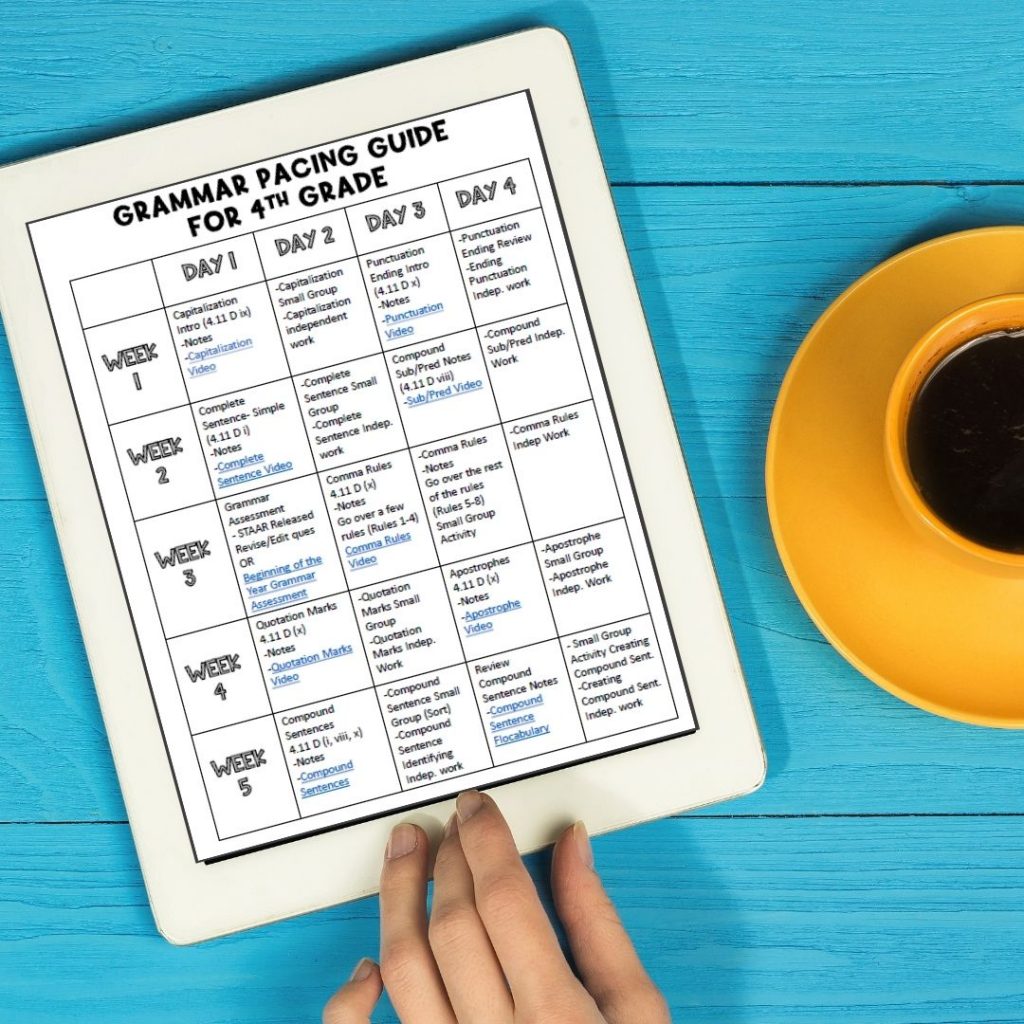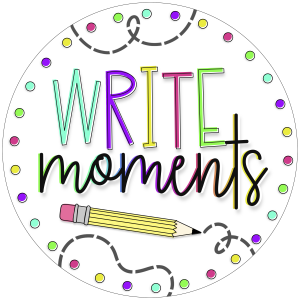Next up on the scope and sequence: POETRY! Teachers and students everywhere react two ways. Yay, I love poetry! Or Oh No, I hate poetry! As you know, people usually have very strong feelings toward poetry. That’s why creating fun and engaging poetry activities for your upper elementary classroom is important.
These 9 activities will help teachers present the content and keep their students interested in learning more about poetry. Check out this list of poetry activities for the upper elementary classroom.
Vocabulary
To begin the poetry genre, it is necessary to introduce the key elements and vocabulary of the genre. I use a poetry slideshow. Students fill in the notes as they follow along.
Then students reference these notes throughout the unit. Since there are so many unfamiliar words in poetry, the students can look up these vocabulary words easily in their notes.
After introducing poetry vocabulary, it is important to provide many hands-on poetry activities. Students need several opportunities to use the vocabulary to internalize the meaning of each word.
Variety
It is very important to expose students to a variety of poems.
First, humorous is always a hit with upper elementary students. Additionally, lyrical, free verse, and narrative poems are important for students to read. These four types of poetry are included in the 3rd and 4th grade TEKS.
Of course, there are many, many more types of poems that students will enjoy. Poems with rules such as sonnets and haikus or concrete poems that form a shape.
Acrostic poems are fun to read, but even more fun for students to write.
Exposing your upper elementary students to different types of poems will help them find the style of poetry they like best.
Analysis
Poem analysis sounds so boring . . . but it is necessary to teach upper elementary students poem analysis strategies, so they can understand the poem they are reading.
The key is to teach simple steps that students will remember and use each time they read a poem: Overview, Read, Breakdown, Elements
First, students look at the poem as a whole. They will do a quick overview that includes circling the title, counting the stanzas and lines, and looking for any unique characteristics (such as a shape).
Next, students read the poem one time all the way through.
Then, students will read each stanza to really understand it. They will take short notes on the side of each stanza.
Finally, students will notice any poetic elements. For instance, figurative language, the rhyme scheme, and the theme of the poem.
Poetry Writing
Throughout the poetry unit, students need to be given opportunities to write their own poems.
At first, students may be hesitant, but remind students that there are no set rules when writing poetry. Anything goes!
Starting with an acrostic poem may be the easiest way to get students going. Also, using a poem that they like as a model will motivate students to write poetry.
Poetry Reading
After writing poems, students need the chance to read their poems aloud.
Set up a poetry reading in your classroom. Students pick their favorite poem that they have written to share with the class.
After reading, students will snap their fingers just like they do at a real poetry reading.
Also, students in the audience can give compliments after listening to each poem being read aloud.
If your students aren’t ready to share their own poems, have them pick their favorite poem from a book to share aloud with the class.
Poetry Novels
Reading a novel that is in poetry form is an excellent way to get your students interested in the poetry genre.
There are several novels that are perfect for introducing poetry to your upper elementary students. These three are by Sharon Creech.
Love that Dog is a story of a boy who doesn’t like poetry, and he doesn’t think he can write poems. As his school year goes on, he gets more and more interested in poetry. Throughout the book, he mentions different poems that his teachers read to the class. All of these poems are listed in the back of the book.
Hate that Cat is the sequel to Love that Dog. It continues the story and introduces poetic elements. The book is written in poetry form and is sure to get your most hesitant students interested in poetry.
Moo is a novel that is about a girl from New York who moves to Maine. The story follows her as she adjusts to her new surroundings.
Poetry Task Cards
Poetry Task cards are an engaging way for students to read poems and practice poetry questions independently in a center or in a small group.
To start off, students will read and discuss the poem. Then they will work together to answer the poetry questions.
Discussing poems with their peers is an excellent way for students to develop their poetry knowledge.
Practice Makes Perfect
Poetry can be a difficult topic for your upper elementary students. It requires deeper thinking and inferencing skills.
Many students need to develop these skills and practice is the only way to do that.
Even after your poetry unit is over, it is important that students continue to practice poetry on a weekly basis.
Reading a poem a week or using poetry passages to review skills will help students remember poetry vocabulary and comprehension strategies.
Poetry Breakout Room
A Poetry Breakout is a fun way to review the poetry genre.
Leave your name and email below, and I’ll send you a FREE Poetry Breakout!
Students work together in groups to complete several poetry passages and questions. Passages and questions are usually boring. However, in this competitive set up, students are engaged and ready to work their hardest to be the first group to win.
If you are looking for more specific details on how to do a Poetry Breakout in your upper elementary classroom, check out my blog post on the topic: Poetry Breakout
Teaching poetry doesn’t have to be boring, there are multiple ways to engage students. After using these poetry activities in your upper elementary classroom, your students will be experts in the poetry genre.
If you are looking for tips to teacher other genres, check out these blog posts:
5 Nonfiction Activities for Upper Elementary






